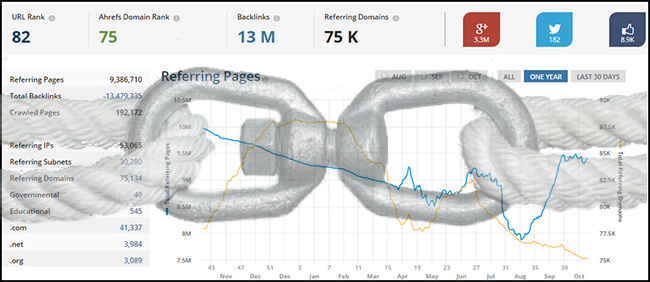Why More Inbound Links Won’t Necessarily Improve Your Search Ranking
Inbound links to your website are still one of the most effective ways of improving your search engine rankings, and are likely to remain so for the foreseeable future. Despite the many problems associated with link building, there is simply no better method of measuring the relevance and authority of a website.
In past years, webmasters were able to easily rank even low quality sites with little relevant content simply by pointing thousands of back links at them. This in turn led to a decline in the overall quality of the results being returned for search engine users, and prompted Google to update its ranking algorithm to weed out those sites artificially enhancing their ranking at the expense of higher quality sites.
Not All Back Links are Equal in the Eyes of Google
In today’s SEO world, the emphasis is on back link quality rather than quantity. Some back links are more highly valued than others, and will generally trump a greater quantity of lesser-valued links for search result ranking purposes.
A number of factors are used to determine the relative value of a link such as:
- The importance of the site providing the link. While the value of PageRank has declined over the years, other metrics such as Domain Authority and Page Authority provide a good indication of the value of the site that is linking out.
- The relevance of the site providing the link. A link from a site about dog training has very little if any relevance for a site about air conditioning repair, and will be evaluated by Google accordingly.
- Whether the link is dofollow (which passes link juice) or nofollow (which passes no link juice).
- The number of outbound links a given page or site has already provided. Google assumes that each succeeding outbound link detracts from the original amount of link juice available until the point is reached when the page or site has exhausted its ability to confer ranking benefits.
- The source of the back link. In essence, the harder it is to obtain a link, the greater the likelihood that Google will value it higher and allow more link juice to pass through to your site. Most public forums, discussion boards, social media channels, directories, and smaller blogs will be lower ranked and will pass less link juice than a link from a well-known authority site.
How to Improve Your Link Building Efforts
Before you approach other sites with a link request, build up your reputation by creating a body of informative and well-written content for your own blog. Authoritative sites will want to be assured of your ability to produce relevant, quality content before they allow you access to their audience.
You can improve the quality of your inbound links by focusing your link building campaign on those sites that are relevant to your niche and have high authority. Trade association and other industry or niche-related sites are obvious choices. Consider approaching sites that are in fields directly related to your industry.
Invest the time and resources to create quality content about your industry or niche that people will want to share and link to. Without great content, you have nothing to offer in exchange for a link.










